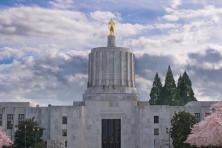With building emissions still the fastest growing sector in Washington State, the legislature is considering a number of ways to address this sector and facilitate a transition to power our homes and buildings with its 100% clean electricity. The bulk of building emissions come from burning fossil fuels for space and water heating and cooking. Pollution from extracting and burning gas accelerates climate change—and it exacerbates asthma and other respiratory health risks, especially for children, the elderly, lower income, and Black, Indigenous and communities of color, who are already disproportionately bearing the burden of air pollutants. Electrifying buildings for heating and cooling is a critical and foundational part of reducing emissions and meeting the state’s greenhouse gas reduction goals.
Targeted Electrification - HB 1767
Allowing public utilities to assist residential customers with upgrading to efficient electric appliances, such as incentives for electric heat pumps for heating and air conditioning. Utilities must ensure an equitable distribution of benefits, and can prioritize low-income communities in the transition to electric appliances.
- The bill has had public hearings in both the House Environment & Energy Committee and the Senate Environment, Energy, & Technology Committee. The House version, which is the prime vehicle, passed out of committee on 1/20. The next step is Rules/House floor.
Expanding the Building Performance Standard - SB 5722
Setting smaller commercial and multifamily buildings on a path to better optimize their energy use and reduce pollution – and providing owners of these buildings access to technical and financial assistance, with priority to under-resourced buildings.
- Passed out of Senate Environment, Energy, & Technology Committee on 2/2, next step is Ways & Means, then Rules and then Senate Floor.
Lead by Example: Designing State Buildings - HB 1280
Leading by example at the state level on building electrification by ensuring that medium and larger-size state building projects assess cost-effective ways to use all-electric systems during the earliest phases of project planning.
- Passed the House floor on 1/21. Heard in the Senate Environment, Energy, & Technology Committee on 2/1 @ 10:30am.
Stronger Energy Codes – HB 1770
Providing an optional stronger residential building code that goes beyond the statewide minimum code for local jurisdictions and ensuring that all new buildings are ultra-efficient and solar-ready post-2034.
- Passed the House Committee on Local Government on 1/21. Next step is Rules/House floor.
Other noteworthy efforts on buildings emissions throughout the state:
Cities and counties in Washington have been increasingly looking to address building emissions to meet their own climate and GHG reduction goals, reduce maintenance and operational costs, and prioritize public health and safety. Momentum is building behind the nationwide building electrification movement and several local jurisdictions have taken action or are in progress among local governments throughout Washington.
- Bellingham will likely become Washington’s fifth city to move on cutting building emissions, as the City Council is poised to vote this coming Monday, February 7 on requiring efficient electric appliances and solar-readiness of all new commercial and large residential buildings.
- Thus far in Washington, Seattle and Shoreline have adopted policies that eliminate most uses of fossil fuels for space heating and hot water in newly constructed commercial buildings, as well as multifamily buildings that are four stories or taller, with the King County Council set to take up a similar policy early this year. Other entities like Olympia, the City of Tacoma and Seattle Public Schools have also made commitments to electrify and phase out gas in buildings.
Addressing public health and building emissions through codes
The Washington State Building Code Council (SBCC) is currently considering the adoption of a stronger energy code that includes proposals to require high-efficiency electric space and water heating in new commercial and large multifamily (four stories and above) buildings. The SBCC updates and improves building and energy codes only once every three years, making 2022 a unique opportunity to adopt the most climate-friendly statewide building energy code in the country. There is broad and diverse supportacross the state for these code proposals. The SBCC will be hosting a set of public hearings during its energy code update process on February 25, 2022 (overflow meeting scheduled for March 11, 2022), and will accept public comment through March 11.
###
ABOUT SHIFT ZERO
Shift Zero’s mission is to catalyze a just transition to zero carbon buildings for all in Washington State. We do this by advocating for policies and programs that maximize energy efficiency and eliminate emissions from buildings. As an alliance, we convene our members’ technical, policy, and advocacy expertise to identify solutions that can scale up to meet the urgency of the climate crisis. Collectively, we educate decisionmakers about how proven design approaches and building technologies can be leveraged to create affordable access to high-performance, resilient buildings. info@shiftzero.org


